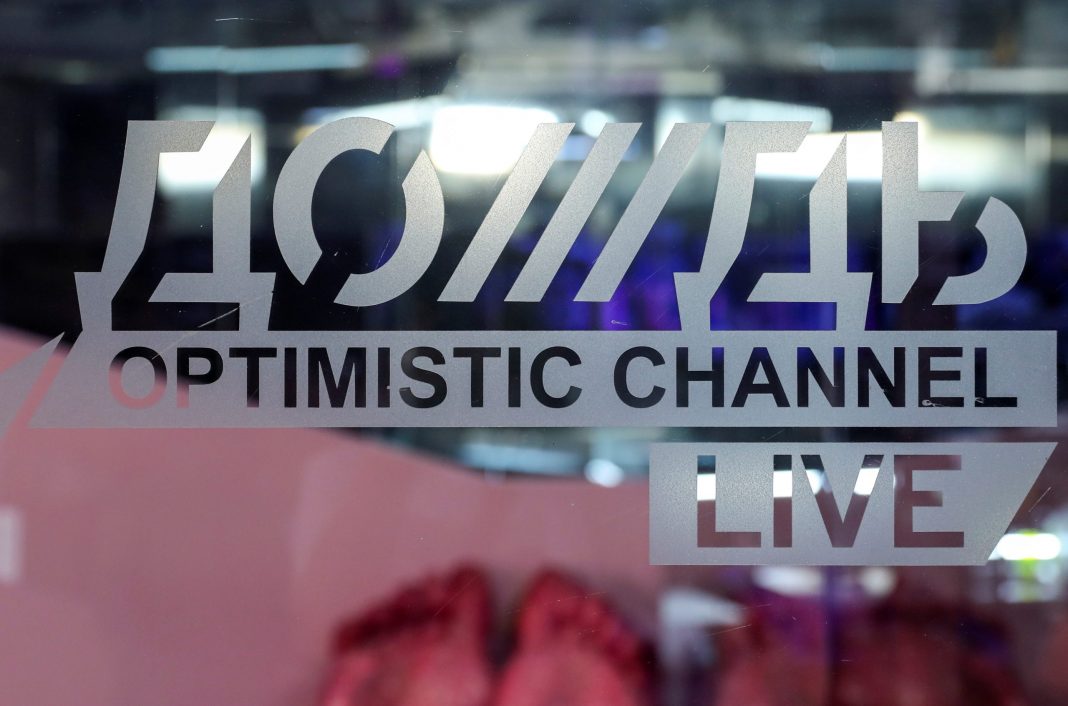By Sam Greene, for CEPA
When it rains, it pours. The decision by the Latvian authorities to rescind the media license for Dozhd — a major, independent Russian online broadcaster — may be legally sound, depending on how you interpret Latvian media law. But as a matter of policy in the West’s resistance to Russia, it is folly.
Dozhd’s reported infractions range from failing to provide audio dubbing in Latvian, to accidentally showing a map that included Crimea in Russia, and an on-air statement by now ex-journalist Alexei Korostelev suggesting that the channel was seeking to support Russian troops on the frontline.
Korostelev’s statement was idiotic, all the more so because it did not in any sense reflect the station’s editorial position or even his own. It did, however, reflect the difficulty that independent Russian journalists and news outlets face in trying to convince Russians — first and foremost Russians living in Russia — to withdraw support for their country’s invasion of Ukraine. Unfortunately, the Latvian authorities’ response similarly reflects a growing misunderstanding in the West of the role that independent Russian media can and indeed must play in ensuring Ukraine’s victory.
Dozhd — and other independent media, including Meduza, Mediazona, Kholod, Novaya Gazeta, and others — have been clear in their condemnation of this war from its very first days. Dozhd’s editorial team fled the country within 10 days of the full-scale invasion, facing charges of treason for their stance; the editors and journalists of Novaya Gazeta did the same, as did most of the other editors and reporters who hadn’t already been hounded out of the country in the preceding years.
From exile, Dozhd and others — supported by Russian journalists brave or foolish enough to remain in the country — have continued to report honestly on the war in ways that cannot be matched by state-owned or privately owned media organizations inside Russia.
Thanks to their reporting, including reporting from the Russian side of the frontlines, we know what we know about the state of the Russian military, about non-existent training, poor equipment, and low morale. Thanks to their reporting, we know about public sentiment from Belgorod to Buryatia, and about the lengths to which the Russian government is having to go to punish ordinary citizens who dare to question the war. Thanks to their reporting, Western analysts and policymakers can make reasoned judgments about the forces that enable and constrain Vladimir Putin’s war effort. Thanks to their reporting, we know about the Ukrainian children the Russian government has abducted, and the war crimes they are continuing to perpetrate behind the front.
Indeed, it is thanks in large measure to the work done by independent Russian journalists that the West has come to believe that Ukraine can and must win this war. Given how much we have come to rely on their work, it is perhaps easy to forget just how extraordinary it is. Russian journalists operating inside Russia do so largely anonymously, in order to avoid arrest and prosecution; and are frequently arrested and prosecuted anyway. Russian journalists operating outside Russia understand that their relatives inside Russia, including elderly parents, will pay the price for their honesty. All the while, Dozhd, Meduza, and the others have made their editorial position abundantly clear: Russia, in their words, is fighting a criminal war, which it must either abandon or lose.
Unfortunately, some in the West have come to believe that our reliance on these journalists — and the shelter and support Western governments and societies have afforded them — somehow means that we are their primary audience. Nothing could or should be further from the truth. Russia’s independent journalists cling to their calling not so that they can tell us what their country is doing, but so that they can open Russians’ own eyes to the crimes of their government. That, in turn, means maintaining traction with those Russian citizens whose eyes are not yet fully open.
It was with that in mind that Dozhd decided to reach out to viewers who had stories to tell about the poor conditions in which Russian troops are fighting. Reportorially, it’s a tried-and-true approach, allowing journalists to gather people’s experiences on their own terms, and compensating for the fact that Dozhd’s reporters themselves cannot openly venture into the field. To suggest that this might also have provided an opportunity to help ameliorate Russian soldiers’ conditions was a mistake, reflecting, at the very least, the journalists’ lack of understanding of the social and political environment in which they are now operating.
Dozhd’s instincts, however, were the right ones. The Kremlin’s propaganda machine gives Russian citizens an encompassing picture of the world, one in which Russia is winning a righteous war against a decaying West, in which Russia’s economy is thriving as the world burns, and in which the country’s rulers have their citizens’ best interests at heart. Dozhd, together with Meduza, is one of only two Russian media outlets with the reach and scope to supplant that picture in its entirety: to show Russians that they are being lied to by corrupt leaders, that Russia is losing a war of imperial ambition, that the West has never been more united, and that unless they rid themselves of Putin, they have no future.
Dozhd and its journalists desperately want Russians to see the world as it really is, both for Ukraine’s sake, and for Russia’s. If Dozhd is forced to close for a second time, that would be a very high price to pay. Western governments and societies should not pretend that Dozhd alone will pay for it.
By Sam Greene, for CEPA
Sam Greene is Director for Democratic Resilience at the Center for European Policy Analysis (CEPA). He is also a Professor of Russian Politics at King’s College London. Before joining CEPA, he founded and directed the King’s Russia Institute.





